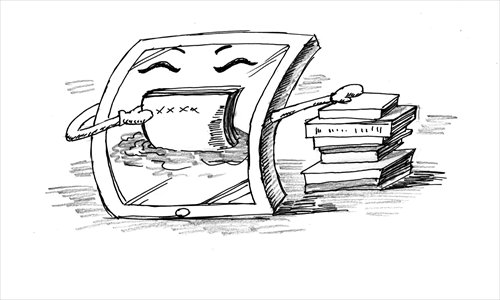HOME >> METRO BEIJING
Reading between the lines of a worthy day
By Tom Fearon Source:Global Times Published: 2012-4-22 19:40:02

Illustrations: Liu Rui and Sun Ying
Today marks World Book and Copyright Day, with April 23 a symbolic date for literature given it is the anniversary of the deaths of Spanish writers Miguel de Cervantes and Inca Garcilaso de la Vega, as well as English playwright William Shakespeare. It's also marks the birth of other prominent authors such as French novelist Maurice Druon and, closer to home, Qing Dynasty (1644-1911) scholar Wei Yuan, who wrote some of the most important narrative works about key historical events including the Opium Wars.
Reading is one of life's simplest pleasures, unlocking a world of possibilities through a habit that encourages us to learn and embrace our imagination. From being read our first book sitting on a parent's knee to downloading the latest bestseller from Apple's iBooks store, reading is a gift that keeps giving throughout life.
It has the power to whisk us away from the mundane surrounds of life and place us in the footholds of medieval empires or at the heart of murder mystery. It has the power to make us laugh and cry, sometimes teaching core moral values along the way. It has the power to teach us about the world, bringing once distant cultures and customs to life through words.
Reading is our cognitive, mental workout, feeding our brains with vital knowledge and keeping the motor running of an imagination that often gets mothballed after childhood.
China's own strides to bring the joy of reading to people made tremendous progress shortly after the founding of the People's Republic in 1949. Coupled with the introduction of a standard language, Putonghua, the push to promote simplified Chinese characters during the 1950s boosted national literacy. The result today is that more than 92 percent of China's 1.4 billion population can read and write using one of the world's most complex written languages.
Reading has evolved to survive in our current digital age when technology threatens to wipe out many traditional pastimes. Look around next time you're on the subway or bus and chances are you'll find a commuter or two clutching an iPad or Kindle device, eagerly turning digital pages on their touch-screen gadgets.
For more traditional bookworms, there's no shortage of pirate booksellers on street corners in Beijing. Knockoff books' weathered, photocopied pages offer readers a slightly less orthodox passage into their enchanting worlds, which brings us to the problem of copyright infringement in China.
Last month, a letter signed by more than 50 Chinese authors on circulated on Sina's popular Twitter-like service Weibo, accusing search engine Baidu of allowing Web users to post the authors' works on Baidu Library without their consent.
From its annals of ancient poetry to modern masterpieces set in the Middle Kingdom, China has made a priceless contribution to the literary world. The country's challenge, we are poignantly reminded today, is to lead by example in the area of copyright protection.
Posted in: Twocents-Opinion